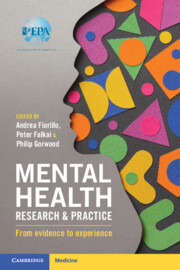Book contents
- Mental Health Research and Practice
- Mental Health Research and Practice
- Copyright page
- Contents
- Contributors
- Preface
- Chapter 1 Chemical and Behavioral Addictions
- Chapter 2 Nonsuicidal Self-Injury in Adolescents
- Chapter 3 Consultation-Liaison Psychiatry and Psychosomatics
- Chapter 4 Recent Developments in Cultural Psychiatry
- Chapter 5 New Perspectives in Eating Disorders
- Chapter 6 Emergency Psychiatry
- Chapter 7 How Can Forensic Psychiatry Contribute to Legal and Ethical Controversies in Society?
- Chapter 8 Diagnosis of Co-occurrent Mental Health Problems in Persons with Intellectual Disability, Major Communication and Insight Difficulties, and Stressor-Related Disorders
- Chapter 9 Attention Deficit Hyperactivity Disorder in Adults
- Chapter 10 Translational Neuroimaging in Psychiatry
- Chapter 11 Challenges in the Therapy of Psychiatric Disorders in the Elderly
- Chapter 12 Position-Taking
- Chapter 13 Physical Health of Patients with Schizophrenia
- Chapter 14 Evolving Concepts for the Assessment and Treatment of Schizophrenia
- Chapter 15 The Role of Rapid-Acting Antidepressants in Suicidal Crisis Management
- Chapter 16 Telemental Health Care
- Chapter 17 Development and Current Status of ICD-11 Mental, Behavioral, or Neurodevelopmental Disorders
- Chapter 18 Anxiety Disorders
- Chapter 19 Did We Lose Interest and Pleasure in the Concept of Major Depression?
- Chapter 20 Personality Disorders
- Index
- References
Chapter 17 - Development and Current Status of ICD-11 Mental, Behavioral, or Neurodevelopmental Disorders
Published online by Cambridge University Press: 01 February 2024
- Mental Health Research and Practice
- Mental Health Research and Practice
- Copyright page
- Contents
- Contributors
- Preface
- Chapter 1 Chemical and Behavioral Addictions
- Chapter 2 Nonsuicidal Self-Injury in Adolescents
- Chapter 3 Consultation-Liaison Psychiatry and Psychosomatics
- Chapter 4 Recent Developments in Cultural Psychiatry
- Chapter 5 New Perspectives in Eating Disorders
- Chapter 6 Emergency Psychiatry
- Chapter 7 How Can Forensic Psychiatry Contribute to Legal and Ethical Controversies in Society?
- Chapter 8 Diagnosis of Co-occurrent Mental Health Problems in Persons with Intellectual Disability, Major Communication and Insight Difficulties, and Stressor-Related Disorders
- Chapter 9 Attention Deficit Hyperactivity Disorder in Adults
- Chapter 10 Translational Neuroimaging in Psychiatry
- Chapter 11 Challenges in the Therapy of Psychiatric Disorders in the Elderly
- Chapter 12 Position-Taking
- Chapter 13 Physical Health of Patients with Schizophrenia
- Chapter 14 Evolving Concepts for the Assessment and Treatment of Schizophrenia
- Chapter 15 The Role of Rapid-Acting Antidepressants in Suicidal Crisis Management
- Chapter 16 Telemental Health Care
- Chapter 17 Development and Current Status of ICD-11 Mental, Behavioral, or Neurodevelopmental Disorders
- Chapter 18 Anxiety Disorders
- Chapter 19 Did We Lose Interest and Pleasure in the Concept of Major Depression?
- Chapter 20 Personality Disorders
- Index
- References
Summary
The International Classification of Diseases (ICD) is developed and maintained by the World Health Organization (WHO). The Eleventh Revision of the ICD (ICD-11) took effect in January 2022 and is the first major revision of the classification in 30 years. The ICD-11 reflects huge advances during this time in scientific evidence, clinical practices, and health information systems. The ICD is used for the classification and reporting of all types of diseases, disorders, and health conditions. This chapter focuses specifically on the ICD-11 classification of Mental, Behavioral or Neurodevelopmental Disorders (MBND). It covers the overall context of the development and metastructure of the MBND classification as well as the priorities and components of the Clinical Descriptions and Diagnostic Requirements (CDDR). The chapter considers what is new in ICD-11 MBND (e.g., the lifespan and dimensional approach, new disorders or removal of categories, coding issues). ICD-11 in the global reform of mental health and care and the role of national European and international professional organizations in education and training of ICD-11 MBND for improving quality treatment and care are constituent parts of this chapter.
Keywords
Information
- Type
- Chapter
- Information
- Mental Health Research and PracticeFrom Evidence to Experience, pp. 293 - 316Publisher: Cambridge University PressPrint publication year: 2024
References
Accessibility standard: Unknown
Why this information is here
This section outlines the accessibility features of this content - including support for screen readers, full keyboard navigation and high-contrast display options. This may not be relevant for you.Accessibility Information
- 1
- Cited by
